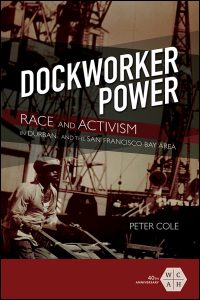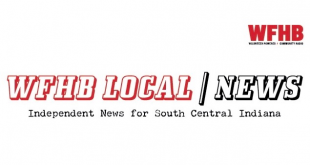Podcast: Play in new window | Download (Duration: 59:00 — 46.0MB)
 Dockworkers have power: workers in the world’s ports can harness their role, at a strategic choke point, to promote their labor rights and social justice causes. Our guest Peter Cole brings such experiences to light in a comparative study of Durban, South Africa, and the San Francisco Bay Area, California. Cole’s research reveals how unions effected lasting change in some of the most far-reaching struggles of modern times.
Dockworkers have power: workers in the world’s ports can harness their role, at a strategic choke point, to promote their labor rights and social justice causes. Our guest Peter Cole brings such experiences to light in a comparative study of Durban, South Africa, and the San Francisco Bay Area, California. Cole’s research reveals how unions effected lasting change in some of the most far-reaching struggles of modern times.
Important aspects of the labor struggle were shared by both groups: First, dockworkers in each city drew on longstanding radical traditions to promote racial equality. Second, they persevered when a new technology—container ships—sent a shockwave of layoffs through the industry. Finally, their commitment to black internationalism and leftist politics sparked transnational work stoppages to protest apartheid and authoritarianism.
Our opening song is by the Buddy Collette Big Band, recorded in 1996 at the Lincoln Theater in Washington DC, this is “Jazz By the Bay.” In 1953, a full year before the Supreme Court’s Brown v. Board of Education decision, Buddy Collette and other California musicians helped end the “separate but equal” practices of the American Federation of Musicians in Los Angeles. Collette was instrumental in the amalgamation of two Los Angeles unions of the American Federation of Musicians – Local 47, the white branch with 15,000 members, and Local 767, the black branch with 800 members. Though successful, most work in Hollywood was still very hard to come by for black musicians, with Collette a notable exception. Buddy Collette will bookend today’s show and in between we’ll hear three iconic South African jazz songs that became anthems in the struggle against apartheid.
Segment One: Cole’s research shows how logistics proves no nation is an island when it comes to racism and capitalism.
Segment Two: San Francisco and Durban, South Africa – two essential locations where a commitment to black internationalism and leftist politics sparked transnational work stoppages to protest apartheid and authoritarianism.
Segment Three: A simple metal box changed the face of the world. With containerization the cost of transportation was massively reduced and this forced changes in labor relations in manifold ways.
Segment Four: Peter Cole is the founding director of The Chicago Race Riot of 1919 Commemoration Project (CRR19). This Race Riot, a term we’ll explore, was an explosion of racially-motivated violence, where whites “rioted” against blacks, leaving 38 people dead (23 black, 15 white) and 537 injured. The worst incident of racial violence in city history, it remains largely forgotten, and it’s this that the CRR19 seeks to correct.
 GUEST
GUEST
Peter Cole is a professor of history at Western Illinois University and a Research Associate in the Society, Work and Development Institute (SWOP) at the University of the Witwatersrand in Johannesburg. Along with Dockworker Power (University of Illinois Press) he is the author of Wobblies on the Waterfront: Interracial Unionism in Progressive-Era Philadelphia (Pluto Press).
RELATED
Building Worker Power on the Docks: an interview with Peter Cole (Jacobin)
Chicago 1919 Race Riot Retrospective
Chicago Race Riot of 1919 Commemoration Project (YouTube)
The Authoritarian Creep (Peter Cole on Interchange)
Shooting the Gulf: Allan Sekula and Logistics (Interchange)
Capital’s (Hidden) Art of War and the Belly of Revolution (Jasper Bernes on Interchange)
 MUSIC
MUSIC
“Jazz By the Bay,” The Buddy Collette Big Band
“Yakhal’ Inkomo,” Mankunku Quartet
“Mannenberg,” Abdullah Ibrahim
“Stimela (The Coal Train),” Hugh Masekela
“Change It,” The Original Chico Hamilton Quintet (Buddy Collette)
CREDITS
Producer & Host: Doug Storm
Executive Producer: Kyrie Greenberg
 WFHB Bloomington Community Radio
WFHB Bloomington Community Radio


